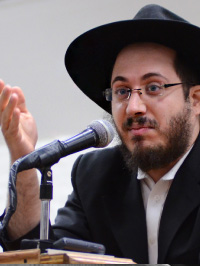The obvious question is as follows: In modern times, we all have access to cars and trains and other modes of modern transportation. Anyone living in Eretz Yisroel can come to Yerushalayim in only a matter of a few hours. If so, would this exclusion of “living too far” not apply in the times of Moshiach when all these modern conveniences will be available to us?
Dear Reader sh’yichyeh,
 This Shabbos we are going to read Parshas HaChodesh from the Torah. In this special portion, which relates G‑d’s words to Moses in Egypt two weeks before the Exodus, we read about the instruction to set the Jewish calendar by the monthly new moon, and to regard Nissan as the “head of months.” G‑d also instructs the Jewish people to bring the Pesach offering, to eat it with Matza and Maror, and to abstain from Chametz for seven days.
This Shabbos we are going to read Parshas HaChodesh from the Torah. In this special portion, which relates G‑d’s words to Moses in Egypt two weeks before the Exodus, we read about the instruction to set the Jewish calendar by the monthly new moon, and to regard Nissan as the “head of months.” G‑d also instructs the Jewish people to bring the Pesach offering, to eat it with Matza and Maror, and to abstain from Chametz for seven days.
The responsibility to individually bring, or be part of a group that is bringing, a Korban Pesach applies to all Jewish people. Yet, as is with many rules, there are two exceptions: If one is impure or “is far away” (BaMidbar 9:10), one may not be able to offer it in a timely manner. What is implied by the term “far away?” The Gemara (P’sachim 93b) explains: “… Any place from where a man is unable to enter [Jerusalem] at the time of slaughtering.”
The obvious question is as follows: In modern times, we all have access to cars and trains and other modes of modern transportation. Anyone living in Eretz Yisroel can come to Yerushalayim in only a matter of a few hours. If so, would this exclusion of “living too far” not apply in the times of Moshiach when all these modern conveniences will be available to us?
Interesting enough, many of the commentaries (Tiferes Yisroel, Pesach HaD’vir) say no! They base their ruling on an interesting ruling of the Gemara. The Gemara (Ibid 94a) says: “Our Rabbis taught: If a person was standing beyond Modi’im and is able to enter by horses and mules, you might think that he is culpable (for not offering the Korban Pesach). Therefore it is stated: ‘and is not in a journey,’ whereas this man was in a journey. If he was standing on the either side of Modi’im, but could not enter on account of the camels and wagons which held him up, you might think that he is not culpable. Therefore it is stated, ‘and is not in a journey,’ for in this case he was not in a journey.”
From the above is clear that even with transportation available, one is still exempt if they live far away. See the Seifer Yemos HaMoshiach B’Halacha (By Rabbi Avraham Gerlitzky) Vol. 2 pg. 457 for an in-depth discussion on the above.
Let us finish with the Bracha: “Blessed are You, G-d, our G-d, King of the universe, who has redeemed us and redeemed our fathers from Egypt, and enabled us to reach this night to eat matza and maror. So too, G-d, our G-d and G-d of our fathers, enable us to reach other holidays and festivals that will come to us in peace with happiness in the rebuilding of Your city, and with rejoicing in Your service [in the Bet HaMikdash]. Then we shall eat of the sacrifices and of the Passover-offerings whose blood shall be sprinkled on the wall of Your altar for acceptance; and we shall thank You with a new song for our redemption and for the deliverance of our souls. Blessed are You, G-d, who redeemed Israel. Amen!”
Rabbi Avtzon is the Rosh Yeshiva of Yeshivas Lubavitch Cincinnati and a well sought after speaker and lecturer. Recordings of his in-depth shiurim on Inyanei Geula u’Moshiach can be accessed at http://www.ylcrecording.com.